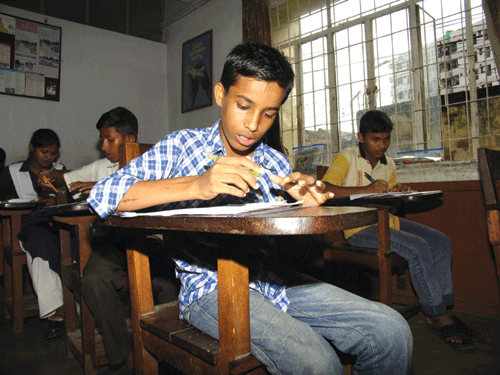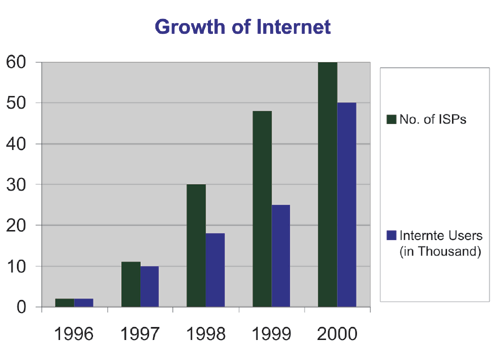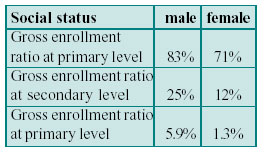INDIA
5,000 e-learning kiosks to come up in villages
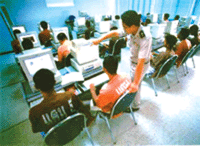 More than 5,000 kiosks to impart computer literacy will come up in villages across India by the end of 2007.
More than 5,000 kiosks to impart computer literacy will come up in villages across India by the end of 2007.
Shakeel Ahmad, minister of state for communications and information technology, said the project would cost about INR30 billion. These kiosks will be set up in local panchayats for training villagers on information communications technology. The trained villagers will help train others in their village.
Foundation of IIIT in Bhubaneswar by President of India
The President of India, APJ Abdul Kalam has laid the foundation stone of the 25-acre campus of International Institute of Information Technology (IIIT) at Bhubaneswar in Orissa.
The IIIT would come up as a world class institute. It would have a vision to contribute to the IT world by focusing on education and research, entrepreneurship and innovation. The Institute will be run as a registered not-for-profit society, funded jointly by the Government of Orissa and the IT industry.
IGNOU in Kochi proposes computer literacy programme
The regional centre of Indira Gandhi National Open University (IGNOU) in Kochi has proposed a State-level computer literacy programme in Kerala.
The programme is proposed for 50 senior secondary schools. In first phase, the project will be implemented in five districts and the schools identified for the project will act as admission-cum-information centres of the university. IGNOU has already started negotiations with the State Government of Kerala for providing MCA programme to high school teachers who are engaged as resource persons in IT@School project. The regional centre would set up placement centres, these will help the candidates to secure a job before passing out of the university.
FOGSI launches satellite based education programme medical colleges
 The Federation of Obstetric and Gynaecological Societies of India has collaborated with the Indian Space Research Organisation for the satellite based education programme for medical students.
The Federation of Obstetric and Gynaecological Societies of India has collaborated with the Indian Space Research Organisation for the satellite based education programme for medical students.
Indian Space Research Organisation has launched the satellite based education programme for medical students and doctors to update their latest information. FOGSI has launched satellite based education programme for doctors and medical students in over 100 municipal and government medical colleges of the country. Initially, Cosme Farma Laboratories Limited (CFLL) will install satellite dishes with technical support from ISRO. FOGSI doctors will develop the course content and distributed live through satellite to over 100 municipal and government medical colleges of India. The satellite centres would be launched in medical colleges of Jaipur, Jammu, Gorakhpur, Patna, Guntur, Manipal, Vadodara and Goa.
Jharkhand government promotes computer education
The Jharkhand government has rolled out a computer education and computer-aided education programme to down link based education at the local level. The programme would be covered in 440 schools across the 22 district of the Jharkhand.
The Jharkhand Education Project Council (JEPC) and the Jharkhand Agency for Promotion of Information Technology (JAPIT) are jointly implementing the project as a part of e-Governance initiative. Core Projects and Technologies Ltd. (CPTL) will provide technology support to the project. The project would be implemented in the duration of five years on a build-own-operate-transfer (BOOT) basis. CPTL will develop the software of the project. The project would be based on Child Tracking System (CTS) modules, which will compile all information of children up to 14 years. Each school would be mapped on the Geographic Information System (GIS). Another project is also in the pipeline, which would be based on audio and video technologies. The government is planning to introduce video surveillance system. These projects would be backed by ISRO and IGNOU and would be integrated with the CTS module. CPTL will provide dotnet, Microsoft, Java eApps, Oracle based products. Even the company is also talking with other State Governments like Maharashtra, Orissa and Chhatisgrah for similar projects.
Manpower shortage a major challenge for ICT
The government is ready to initiate changes in the education system to boost the skills of students in the field of information and communication technology (ICT) to overcome an expected shortage of around 500,000 skilled workers in the next few years, says Jainder Singh, secretary, department of information technology.
This he said after releasing a report titled, ‘Making the Connection: India’s digital future’, which is based on a study conducted by Accenture in collaboration with the Confederation of Indian Industry (CII). The study, based on a survey of more than 200 top business executives across India highlights the fact that ICT is growing to play a major role in expansion of low-income markers in near future. About 88 percent of the survey respondents consider ICT to be a major driver of the current and future development. A similar number said that the increased usage of ICT would be a major determinant in overcoming disparities between the rich and poor.
Indian SSA experiences shared at Cairo
The Minister of State for Human Resource Development D. Purandeswari has suggested in Education For All (EFA) meeting at Cairo that other countries can learn from the successful Indian experience in implementing schemes like Sarva Shiksha Abhiyaan, Mid Day Meal, Education Guarantee Scheme (EGS) centres for hard to reach target groups and the National Literacy Mission.
Purandeswari led a high level delegation in the 6th High Level Group Meeting on Education for All (EFA), in Cairo, Egypt, 14-16 November 2006. She also elaborated on the innovative resource mobilisation methods for achieving the goal of EFA while referring to the educational cess and the Prarambhik Siksha Kosh being adopted by the Government of India. The Minister also spoke about the special intervention regarding the Indian girls in terms of free uniform, text books and also special schools, for girls belonging to disadvantaged sections of society.
CBSE to begin satellite education in India
Central Board of Secondary Education (CBSE) has decided to launch a satellite education programme in schools across the country from next year. An initiative of the vocational education
 department, CBSE, specific lessons would be transmitted through satellite from various regional offices of the board under the programme.
department, CBSE, specific lessons would be transmitted through satellite from various regional offices of the board under the programme.
While NCERT is developing the curriculum, ISRO would help use modern space technology for promotion of education and training. To be propagated through Edusat, the satellite education wing run by ISRO, ministry of human resource development and Indira Gandhi National Open University, the programme would begin through teachers’ training programmes and later reach classrooms.
The programme would be managed by six regional offices of CBSE located in Allahabad, Guwahati, Chennai, Chandigarh and Ajmer. Schools in Jharkhand would come under the Allahabad centre.
National testing standards to help quality of education
An Approach Paper of the Planning Commission says that a set of national testing standards and a chain of institutions that test and evaluate children would help monitor and improve quality of learning. Noting that just 28 per cent An Approach Paper of the Planning Commission says that a set of national testing standards and a chain of institutions that test and evaluate children would help monitor and improve quality of learning. Noting that just 28 per cent of schools had electricity in 2005 and only 40 per cent of primary school teachers were graduates and 30 per cent had not even completed higher secondary, it says, for a large proportion of children, school is an ill-lit classroom with more than one class being taught together by some who may not have completed her own schooling. Monitoring these aspects would need to correlate such facts with learning skills to identify where the real problems lie – pre-school, teachers, state governments, design of Sarva Shiksha Abhiyan or the assumed equirements for universal education, the report says. On the Secondary Education front, the report says that the 11th Plan must aim to progressively raise the minimum level of education to high school or Class X level. Observing that extension of secondary education in ural areas posed a special challenge since secondary schools cannot be set up in every village, the report said the present trend of combining upper primary with secondary school education may need to be strengthened. CS course to go online from 2007 To make the Company Secretary (CS) course widely accessible it will be offered online from next year. Currently, the course is offered through classroom teaching and via post. Once the course is web-based, students can access the course at their desktops at their own convenience, according to the sources of Institute of Company Secretaries of India (ICSI). The institute has started providing the study material on CD. Plans are to start the programme by early next year. In the first phase, the institute will offer the foundation course.



















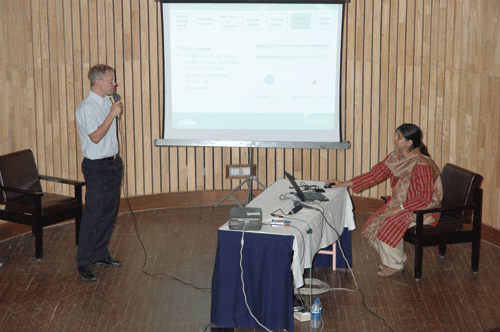

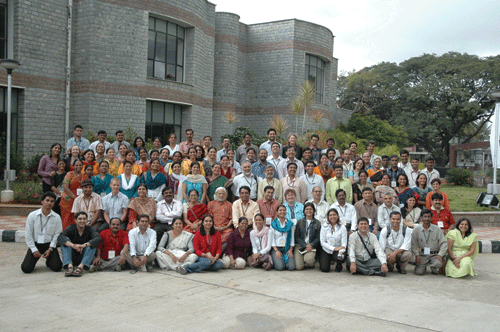
 More than 5,000 kiosks to impart computer literacy will come up in villages across India by the end of 2007.
More than 5,000 kiosks to impart computer literacy will come up in villages across India by the end of 2007. The Federation of Obstetric and Gynaecological Societies of India has collaborated with the Indian Space Research Organisation for the satellite based education programme for medical students.
The Federation of Obstetric and Gynaecological Societies of India has collaborated with the Indian Space Research Organisation for the satellite based education programme for medical students. department, CBSE, specific lessons would be transmitted through satellite from various regional offices of the board under the programme.
department, CBSE, specific lessons would be transmitted through satellite from various regional offices of the board under the programme.